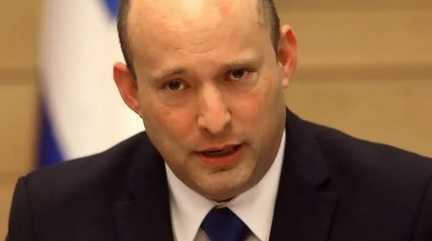
21 June 2022; MEMO: Israeli Prime Minister Naftali Bennett and his deputy, Foreign Minister Yair Lapid, have announced their agreement to dissolve the Knesset (parliament) and go for an early General Election.
In the meantime, Lapid will take over as interim Prime Minister. Bennett will become the alternate prime minister with responsibility for the Iran file.
The decision draws the curtain on a government coalition consisting of eight parties that was only able to last a year. The election is expected to be held in October, and will be the fifth in just three and a half years.
On 9 April, 2019, the Likud party of incumbent Prime Minister Benjamin Netanyahu won 35 of the 120 seats in the Knesset. His main rival, the Blue and White coalition headed by Benny Gantz and his partner Yair Lapid, also won 35 seats. However, neither was able to form a government, so parliament was dissolved, and a second election was called for 17 September in the same year.
On this occasion, the Blue and White alliance led by Gantz and Lapid won 33 seats; Likud won 32. Again, neither party was able to form a government within the required time, so the Knesset was dissolved and another election was called for March 2020.
Although Likud then won the largest number of seats (36), and Blue and White won 33, they again failed to form a government. However, Netanyahu and Gantz agreed to form a government in turns. This did not survive due to its inability to pass the budget and disagreements between Netanyahu and Gantz. The Knesset was duly dissolved in December 2020.
The next election was held on 23 March, 2021, in which Likud won the most seats (30), and the Blue and White alliance between Lapid and Gantz was dissolved, but Netanyahu still failed to form a government. Instead, an unlikely alliance between eight parties was determined to end Netanyahu's term as prime minister which resulted in a coalition government taking office on 13 June last year.
The coalition agreement was that the premiership would be rotated between Lapid, the leader of the centrist Yesh Atid party, and Bennett, the leader of the right-wing Yamina party. Bennet took office first, and was scheduled to swap with Lapid in September 2023.
The coalition was made up of parties with a shared desire to remove Netanyahu from power: Yamina (right wing) led by Bennett; Yesh Atid (centre) led by Lapid; New Hope (right wing) led by Gideon Sa'ar; and Yisrael Beiteinu (a nationalist right-wing party hostile to religious Jews), led by Avigdor Lieberman. It also included the Blue and White parties (centre) led by Benny Gantz; Labour (centre) led by Merav Michaeli; and Meretz (left wing), led by Nitzan Horowitz, as well as the United Arab List led by Mansour Abbas, who supports the government from abroad.
Although the coalition faced many difficulties, its inability to extend the Emergency Regulations Law on 7 June, which treats Jewish settlers in the occupied West Bank as Israelis, led to the overthrow of the government and the call for yet another General Election.




